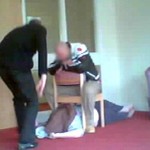
A short while ago, the Learning Disabilities Elf made a small contribution to the Justice for LB campaign by trying to draw attention once again to the evidence base.
Wednesday (day 91) saw the publication of a key report from the Care Quality Commission and Challenging Behaviour Foundation, which tells the stories of three young people and their families who were let down by learning disability services that should have been caring for them.
At the heart of policy for supports for people with learning disabilities is the notion of person centred planning – responding to the needs of individuals and working in partnership with their families and supporters, but the three stories in the report show clear failures to work in this way.
Care Quality Commission and Challenging Behaviour Foundation Event
The report itself grew out of an event in in February 2014, chaired by Professor Louis Appleby who is a member of the CQC board. Everybody present at the event was able to identify actions they could take to address the issues identified in the three stories.
A key operational message was that actions should be taken within the context of the already existing national initiatives, for example
- The Joint Improvement Programme Team
- The DH team reviewing the Mental Health Act Code of Practice.
- The DH Learning Disability Programme Board chaired by the Minister of State.
The Three Lives
This is a report of that meeting and the proposed resulting actions. These have been thematically grouped, based on the discussions and the recorded feedback.
The family stories told at the event tell a tragically familiar story and outlined the experiences of:
- 18 year old Connor, who tragically died at an assessment and treatment centre after he was found unconscious after a seizure whilst unsupervised in a bath.
- Kayleigh, who spent 10 years in assessment and treatment centres, including Winterbourne View.
- Lisa who was kept for the majority of the time in a locked area at an assessment and treatment centre with staff interacting with her through a small letterbox style hatch.

The three stories told a tragically familiar story
Common Themes
The common themes identified by those at the event were:
- The importance of understanding the person, and listening to them and their family
- The need for local professional expertise and early intervention close to home
- The importance of good multidisciplinary support, including transition between child and adult services
- The closure of services that do not meet people’s needs, and which are at odds with the right models of care
- Implementing the evidence base that exists for person centred local services based on positive behavioural support

Evidence based, person centred and local services needed
Actions for the participants
The actions identified cover:
- Improving information for planning through the learning disability census and local commissioner review
- Creating a clearer strategic focus through a national strategy for learning disability secure services
- Strengthening the focus of CQC regulation on services demonstrating a shift to individual outcomes
- Better workforce development to ensure services staffed with skilled and able professionals
Conclusion
The report’s authors point out that there is now a compelling evidence base for how to support individuals and their families. The evidence base clearly points to the need for the availability of community-based, person-centred and personalised supports, close to family and local contacts, to be available across the country, with crisis support available and based on positive behaviour support approaches.
However they also point out that this report will be added to “the plethora of other reports and publications about what needs to be done to deliver safe, effective dignified care for people with learning disabilities and their families” and they want to ensure that progress is being made on the commitments that were given at the meeting in February.
The plan is for the group to meet again in September of this year and the Learning Disabilities Elf will endeavour to report on that when the group publish their progress later in the year.
Link:
3 Lives: What have we learned, what we need to do, Care Quality Commission and Challenging Behaviour Foundation, 2014


@CareQualityComm & @CBFdn publish ‘Three Lives’ Report with commitments to action via @LearningDisElf http://t.co/JzYQGewu34
CQC and CBF Three Lives report calls for implementation of evidence base http://t.co/fyoZAFbrCU
CQC and CBF publish ‘Three Lives’ Report with commitments to action – The Learning Disabilities Elf http://t.co/dwPzHu0IIM
Are lessons being learned? CQC and CBF publish ‘Three Lives’ Report with commitments to action http://t.co/UgUA9HiFlg via @sharethis
Meanwhile all the people involved in yet another report go back to their comfortable lives safe in the knowledge that they will again be called on to write another report that no one in power gives two hoots about and so the circle goes round and around Keeps them all in a job I suppose.